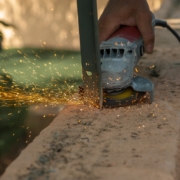Should You Really DIY Your Home Renovations?
Ever since the pandemic, DIY home renovations have skyrocketed, but the reality is that home DIY projects are risky and often expensive. Let’s dive into why hiring a local contractor is more beneficial.
Expenses, Hazards, and Risks
Many homeowners don’t realize how long their DIY projects will take. What they believe to be a weekend project stretches into weeks and months. Time is money, and mistakes could cost a significant amount of time.
Fortunately, a contractor will save you time by:
- Coordinating deliveries and disposal
- Ordering materials
- Overseeing all subcontractors
- Setting up a schedule and sticking to it
You’ll need many tools to do a home project properly. Do you have all of these?
- Demolition tools
- Voltage tester, sawzall, sledgehammer, and a crowbar
- Basic tools
- Sander, hammer, air compressor and nailer, screwdrivers, multi-tool, wrenches, sockets, cordless drill, clamps, level, stud finder, level, tape measure, pliers, and a speed square
- Safety items
- Safety glasses, ear protection, respirators, and work gloves
- Saws
- Jigsaw, table saw, circular saw, and miter saw
- Painting items
- Brushes, rollers, lights, and drop cloths
- Others
- Ladder, truck, shop vac, saw horses, and extension cords.
Even if you have all the tools, you must train to use them.
To complete a home renovation project, you must know the costs, project schedules, codes, permits, design planning, and design. On the other hand, a contractor is an expert on these topics and can provide you with a clear understanding of your budget constraints.
Doing on-the-job training, not HGTV or YouTube would be best. The required professional skills include:
- Carpentry
- Installing cabinetry and flooring
- Tile work
- Framing, insulation, and drywall
- Electrical, plumbing, and HVAC
- Demolition
Many DIY projects are illegal because you need a permit to follow codes. Besides, permits and codes protect you and your neighbors. For example, permits prevent you from digging through electrical cables by specifying that you must mark utilities before breaking ground.
Another example is that a permit ensures that your deck has all the required safety features and is attached to your house correctly.
Electrical Work
You must have a permit to tap into an electrical system, like if you are:
- Relaxing circuit breakers
- Adding electrical outlets
- Installing a central vacuum system
- Installing or repairing a hard-wired electrical system
- Converting a kitchen range from electric to gas
Jurisdictions are so vigilant about electrical work because of the danger involved. The most significant risks are fires and electrocution. Inspectors must view projects when they’re in progress and complete them to ensure there aren’t safety violations.
Plumbing Projects
Building codes concerning plumbing protect your community from mold, blockages, water damage, and sewage backups. So, here is a list of projects that require a permit:
- Adding a new plumbing feature
- Installing or repairing a septic tank or dry well
- Replacing a water heater
- Moving a plumbing fixture more than six feet
- Repairing or replacing pipes
Tree Removal
In some jurisdictions, you legally need a permit to remove trees. The safest option is to hire an arborist or tree removal service.
Mistakes Can Be Drastic.
There are so many potential hazards when it comes to DIY home renovations:
- Sledgehammers
- Demolition
- Nail guns
- Wiring
- Lifting heavy items
- Asbestos and lead paint, which experts need to test for and remove
- Gas leaks
- Explosions
When you make mistakes, you waste quality materials.
If you mess up a plumbing project, you can create leaks that slowly rot your wood and cause more significant leaks or water damage. Furthermore, HVAC mistakes could cause CO2 leaks, potential electrical issues, and energy waste.
63% of homeowners regret doing DIY renovation projects. So, if you live in Canada or the U.S., MAKE A FREE REQUEST for a local contractor on GetAssist instead of getting yourself in a risky situation.
Please leave it to the pros and enjoy the fresh changes in your home!









Leave a Reply
Want to join the discussion?Feel free to contribute!